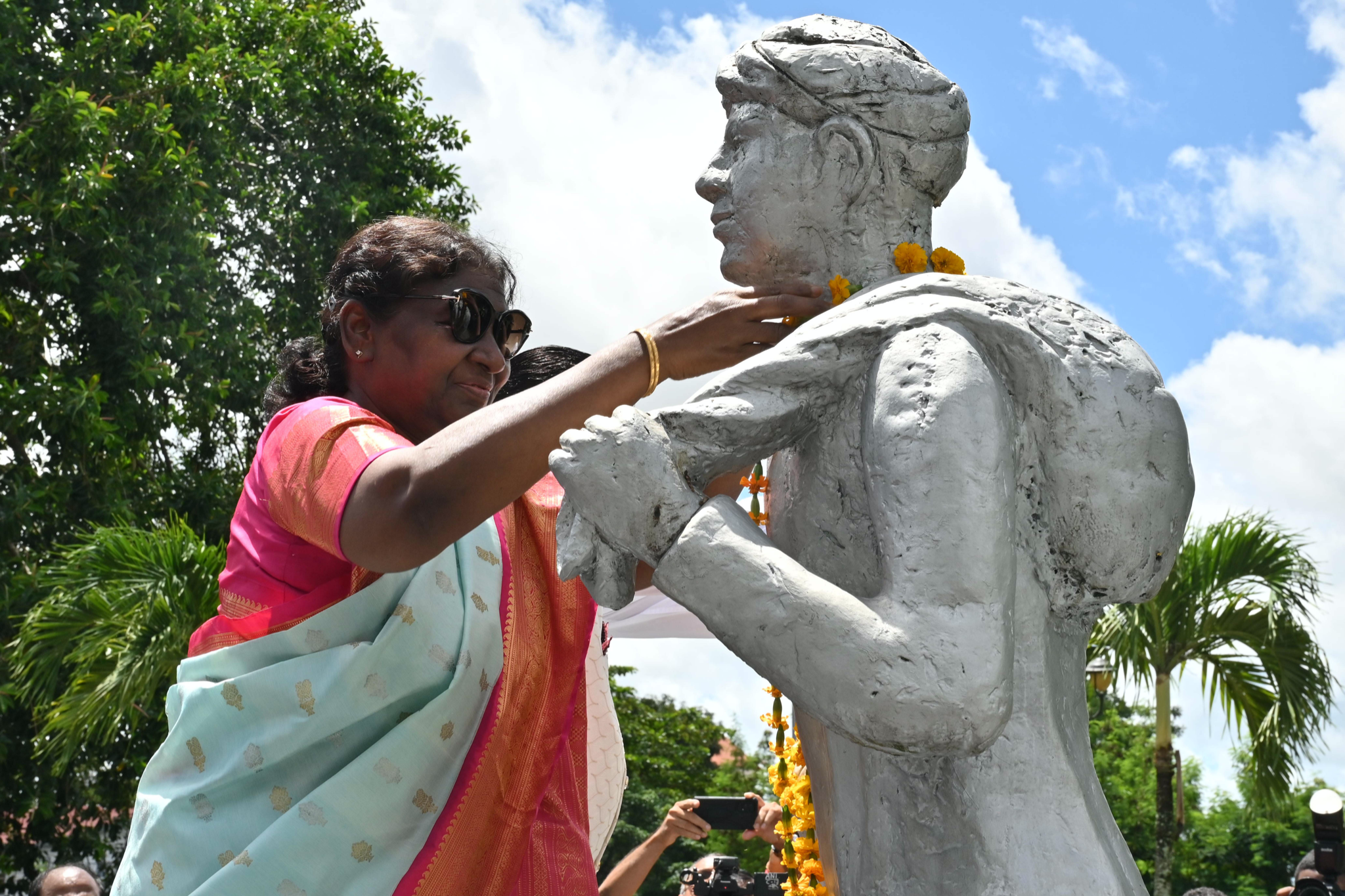
Disclaimer: Copyright infringement not intended.
Context
- The President of India, Smt Droupadi Murmu, and the President of Suriname, Chandrikapersad Santokhi, participate in a cultural festival in Paramaribo to mark the commemoration of the 150th anniversary of the arrival of Indians in Suriname.
Details
Cultural Festival and Historical Milestone:
- President of India, Smt Droupadi Murmu, and President Chandrikapersad Santokhi of Suriname witnessed a cultural festival in Paramaribo.
- The festival commemorates the 150th anniversary of the arrival of Indians in Suriname.
- The first group of Indians arrived in Suriname on June 5, 1873, aboard the ship Lalla Rookh.
Suriname's Multicultural Society:
- President Murmu acknowledges Suriname as a multicultural society that has welcomed diverse communities.
- Over the years, the communities have evolved into one family and one country.
- Appreciation for the dedication and commitment to unity and inclusiveness in Suriname.
Indian Diaspora and Deepening Partnership:
- Despite geographical distances and cultural diversity, the Indian diaspora remains connected to their roots.
- The Indian community has become an integral part of Surinamese society.
- The Indian diaspora constitutes an important pillar in the deepening partnership between India and Suriname.
Extended Eligibility for OCI Card:
- President Murmu announces India's decision to extend the eligibility criteria for Overseas Citizen of India (OCI) Card.
- The eligibility will now include up to the sixth generation of original Indian immigrants from Suriname.
- The OCI card is seen as an important link in the 150-year-old relationship between India and Suriname.
- Encouragement for the Indian diaspora to maintain their connections with India.
Solidarity and Shared Aspirations:
- Solidarity between Suriname and India based on rebuilding economies and social systems after colonial rule.
- India-Suriname bilateral relations are grounded in shared aspirations for development.
Honors and Recognition:
- President Murmu pays homage at the Baba and Mai monument and the Mama Sranan monument.
- The President receives the highest civilian honor of Suriname, the 'Grand Order of the Chain of the Yellow Star.'
- Dedication of the honor to successive generations of the Indian-Surinamese community.
Inclusive World Order and Global Engagement:
- President Murmu emphasizes India's approach to an inclusive world order that considers the interests of every country.
- India's assistance to over 100 countries during the Covid-19 pandemic.
- India's engagement through the G-20 presidency and the Voice of South Summit.
Appreciation for Suriname's Participation:
- President Murmu appreciates Suriname's participation in India's initiatives, including the Voice of South Summit.

About Suriname
Geographical and Demographic Overview:
- Suriname is a country located on the northeastern coast of South America, bordered by Guyana, Brazil, and French Guiana.
- It has a diverse population consisting of multiple ethnic groups, including Creoles, Hindustanis, Maroons, Javanese, Chinese, and Indigenous peoples.
Colonial History and Independence:
- Suriname was a Dutch colony from the 17th century until gaining independence on November 25, 1975.
- The legacy of colonization has influenced Suriname's cultural, linguistic, and legal systems.
Political System:
- Suriname is a democratic republic with a multi-party political system.
- The President is the head of state and the government is formed through parliamentary elections.
Cultural Diversity:
- Suriname is known for its cultural diversity, with various ethnic groups maintaining their traditions, languages, and customs.
- Festivals, music, dance, and cuisine reflect the multicultural fabric of Surinamese society.
Natural Resources and Economy:
- Suriname possesses rich natural resources, including bauxite, gold, oil, and timber.
- The mining and agricultural sectors, particularly rice and bananas, play a significant role in Suriname's economy.
- Tourism is emerging as a potential sector for economic growth.
Environmental and Biodiversity Importance:
- Suriname is recognized for its pristine rainforests and abundant biodiversity.
- The country has made efforts to protect its natural environment through conservation initiatives and sustainable practices.
International Relations:
- Suriname maintains diplomatic relations with various countries, actively participating in regional and international organizations.
- It is a member of the United Nations, the Caribbean Community (CARICOM), and the Union of South American Nations (UNASUR).
Challenges and Development Priorities:
- Suriname faces challenges related to economic diversification, infrastructure development, poverty reduction, and healthcare improvement.
- The government is focused on attracting investments, enhancing education, and promoting sustainable development to address these challenges.

Background of Suriname Relations with India
Historical and Cultural Ties:
- The arrival of Indians in Suriname marks an important milestone in the history of Suriname, establishing a historical connection between the two nations.
- India and Suriname share cultural and historical ties due to the presence of a significant Indian diaspora in Suriname.
- The Indian community has integrated into Surinamese society and contributed to its multicultural fabric.
Bilateral Cooperation:
- Both countries have worked towards strengthening bilateral ties and promoting cooperation in various fields.
- India and Suriname have engaged in diplomatic exchanges, high-level visits, and discussions to enhance collaboration.
- The focus has been on areas such as trade, investment, agriculture, education, health, and technology.
Economic Partnership:
- Economic cooperation between India and Suriname has gained momentum in recent years.
- Efforts have been made to promote trade and investment through bilateral agreements and business delegations.
- India has extended lines of credit and technical assistance to support infrastructure projects and capacity building in Suriname.
Development Assistance:
- India has provided development assistance to Suriname, particularly in sectors such as agriculture, healthcare, information technology, and renewable energy.
- These initiatives aim to support Suriname's socio-economic development and strengthen its institutional capabilities.
People-to-People Exchanges:
- Cultural exchanges, academic scholarships, and training programs have facilitated people-to-people interactions between India and Suriname.
- These exchanges help foster a deeper understanding and appreciation of each other's cultures and traditions.
International Cooperation:
- India and Suriname have collaborated on international platforms, including the United Nations, to address common challenges and promote shared interests.
- They have supported each other's candidatures and positions on various global issues.
COVID-19 Assistance:
- India has extended support to Suriname during the COVID-19 pandemic, providing medical supplies, vaccines, and technical expertise to combat the spread of the virus.
- This cooperation reflects the solidarity and friendship between the two countries in times of crisis.
Recent Developments:
- In 2017, India provided Suriname with a $10 million line of credit to support the construction of a new water treatment plant in Paramaribo.
- In 2018, India and Suriname signed a memorandum of understanding on cooperation in the field of agriculture.
- In 2019, India and Suriname held their fifth joint commission meeting, which focused on strengthening cooperation in trade, investment, education, and culture.
- In 2020, India provided Suriname with medical supplies and equipment to help the country fight the COVID-19 pandemic.
|
PRACTICE QUESTION
Q) Discuss how the Indian diaspora in South America can contribute to the deepening of India's economic interests. 250 words
|
https://pib.gov.in/PressReleasePage.aspx?PRID=1930132




